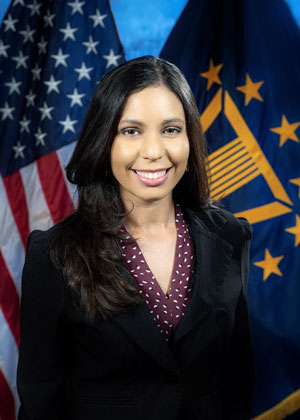Attention A T users. To access the menus on this page please perform the following steps.
1. Please switch auto forms mode to off.
2. Hit enter to expand a main menu option (Health, Benefits, etc).
3. To enter and activate the submenu links, hit the down arrow.
You will now be able to tab or arrow up or down through the submenu options to access/activate the submenu links.
Locator
Contact
Search
VA »
VA Homeless Programs
»
Message from Monica Diaz, Executive Director, VHA Homeless Programs Office
VA Homeless Programs
Message from Monica Diaz, Executive Director, VHA Homeless Programs Office
March 2023

Every March, St. Patrick’s Day invites us to borrow some luck from the Irish.
But this month is also an opportunity to remember a lesser-known act of fortune involving Congress, the United States Navy, a group of altruistic Americans, and the Irish people.
In 1845, a devastating famine began in Ireland when the country’s potato crop—and primary source of food—was infested with bacteria. The result was dire hunger, widespread malnutrition, and ultimately, death for one million Irish citizens.
Two years into the “Great Hunger,” a concerned group of Bostonians decided they needed to do something to help. Captain Robert Bennet Forbes, a civilian merchant, asked a bold favor of Congress: Could he use a U.S. Navy warship to deliver supplies to the Irish people?
On March 28, 1847, the USS Jamestown left Boston, loaded with tons of food donated by Americans.
“Direct aid from the United States to Ireland became a first-ever national deluge of generosity that shocked the world, and in many ways, changed it,” argues historian and author Stephen Puleo in the Boston Globe.
The USS Jamestown would be the first of 118 U.S. ships to travel to Ireland during this time, bringing millions of dollars’ worth of food, supplies, and clothing donated by Americans. The advocacy of Americans on behalf of Ireland even led the U.S. Navy to alter the USS Constellation to create more room for “over 2,500 barrels of potatoes and flour” delivered by the Navy in 1880.
While the use of a U.S. warship by civilians remains unprecedented in the United States, the USS Jamestown mission set a new standard for philanthropy, leadership, and service that remains deeply ingrained in our American identity today.
These values are visible every day in the work VA homeless programs and our partners are doing to end Veteran homelessness. Like the Americans who led the USS Jamestown effort, we believe that we cannot sit idly while injustice threatens the well-being of others. We know that when we choose to do the right thing—even if it is the hard thing—we can change the world.
During Social Work Month, we celebrate the selfless individuals who have dedicated their lives to changing the world. I am proud and honored to know and learn from dedicated, compassionate, and talented social workers every day. Without the social workers of VA, and those of our community partners, we would not be able to deliver such outstanding services and outcomes to our Veterans.
Although the social workers we know may make changing the world look easy, the profession is extremely demanding and challenging. Every day, social workers are fighting on the frontlines of society’s most difficult problems. The things they see, experience, and help others process cannot be easily left behind at the office. Instead, an invisible component of their job description entails enduring secondary grief and helping to carry the burden of others’ trauma.
This month’s episode of the Ending Veteran Homelessness podcast highlights the consequences of this “persistent and pervasive stress,” which we recognize as burnout. While we hear the term “burnout” often, it can be a difficult phenomenon to define—and even more difficult to address. I urge everyone to listen to this important episode, and to remember that if you are experiencing burnout, you are not alone.
At VA, we are working to address burnout and implement systemic changes that support our staff—and consequently, our Veterans—in the best ways possible. However, it is important to remember that burnout is not unique to VA, or to social workers. Americans everywhere are vulnerable. When we are aware of the signs of burnout, we are more prepared to help ourselves, and others, who may be struggling.
Concerningly, women may be experiencing burnout at higher rates than their male counterparts. According to UNICEF, “Experts generally agree that there’s no single reason women burn out, but they widely acknowledge that the way societal structures and gender norms intersect plays a significant role.”
During Women’s History Month, let’s commit to celebrating the inspirational women in our lives by taking action to protect those we love from burnout. I believe the first step is simple: talking about it. Too often, women feel an overwhelming pressure to “have it all together.”
Admitting we need help with something is hard—I know firsthand! Balancing motherhood, working full-time, and my own self-care can be a challenge—but I have learned to accept and ask for help. I have found that when I do so, I am able to show up more fully for my family, my team, and for America’s Veterans.
Women’s History Month is also a perfect time to celebrate the new VA mission statement, which now represents of all those who have served in our nation’s military—including women Veterans, Veteran families, caregivers, and survivors. Over the next months, you will see this new mission statement used across VA: “To fulfill President Lincoln's promise to care for those who have served in our nation’s military and for their families, caregivers, and survivors.” Learn about why the new mission statement is important.
With March coming “in like a lion,” it is fitting that VA announced ambitious new goals toward ending Veteran homelessness this month. I know that we will achieve these goals on behalf of our Veterans—and in doing so, we will uphold what the USS Jamestown proved nearly 200 years ago, and what our Veterans and service members have proved since: When Americans are determined to help, nothing can stand in our way.





























